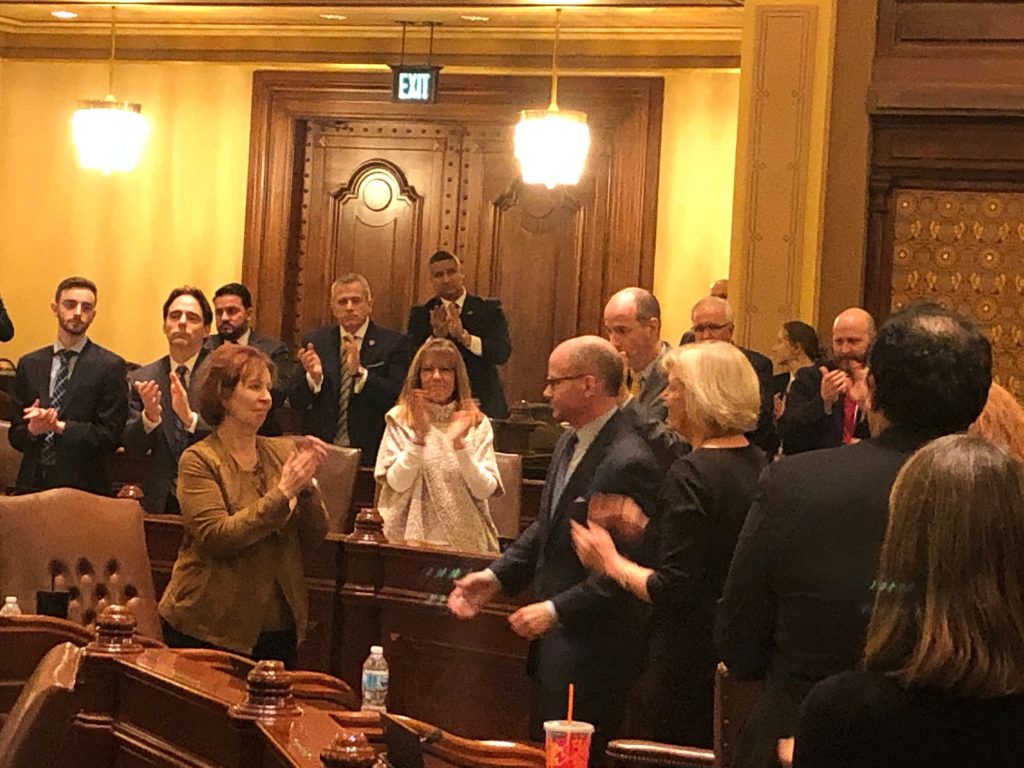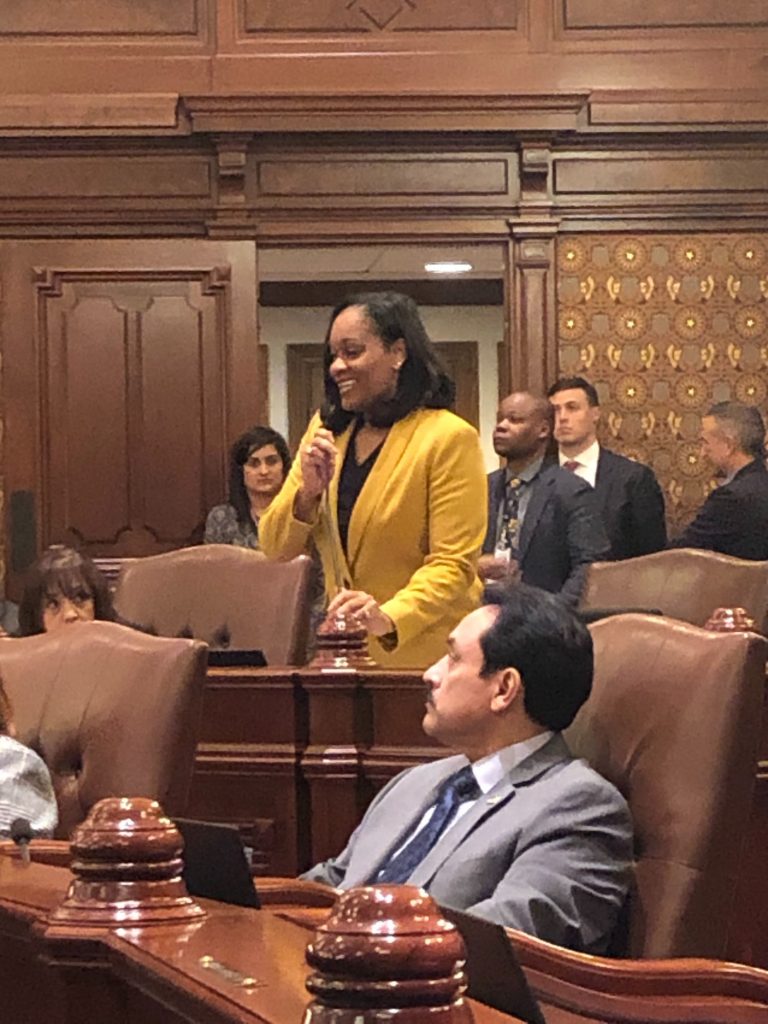-
After protests by child welfare advocates in both the fall and winter, the state of Illinois has now twice delayed the transition of thousands of foster children in Illinois from traditional fee-for-service Medicaid to Medicaid managed care.
But the Saturday deadline for transitioning former youth in care — children that have been adopted or have aged out of the foster care system — to Medicaid managed care looms this weekend, and adoptive parents are worried.
-
The state of Illinois has lost out on an estimated $10.7 million in federal matching dollars during the past four fiscal years as a result of “miscoding errors” that marked American citizens or permanent residents as undocumented in the state’s Covering All Kids health insurance program, according to a new audit.
-
Advocates for several energy-related bills introduced last year designed to change the way in which Illinois residents use and pay for energy saw their efforts thwarted at the Statehouse in the waning weeks of spring legislative session last year as a handful of other mega bills took center stage.
-
Sixteen Illinois residents who cast a ballot in the 2018 election are unlikely to be prosecuted for violating federal election law because of a little-known clause of the 2017 law that automatically added them to the voting rolls.
-
Gov. JB Pritzker said he will push a bill authored by Cook County Assessor Fritz Kaegi, which would give the Cook County Assessor’s office — and other offices statewide — the ability to collect operating income and expense data from commercial properties through the General Assembly.
 Gov. JB Pritzker signs a bill backed by Cook County Assessor Fritz Kaegi, as he looks on. [Hannah Meisel/The Daily Line]
Gov. JB Pritzker signs a bill backed by Cook County Assessor Fritz Kaegi, as he looks on. [Hannah Meisel/The Daily Line]
-
In the hours before six-term Senator Don Harmon (D-Oak Park) was officially elevated to the rank of 39th Illinois Senate President on Sunday, Majority Leader Kim Lightford (D-Maywood) said she learned the full extent of betrayal from fellow Black Caucus co-chair State Sen. Emil Jones III (D-Chicago), who went public with his support of Harmon on Friday night.
 Senate Democratic colleagues applaud new Senate President Don Harmon (D-Oak Park) after being elected to his new leadership post Sunday evening. [Hannah Meisel/The Daily Line]
Senate Democratic colleagues applaud new Senate President Don Harmon (D-Oak Park) after being elected to his new leadership post Sunday evening. [Hannah Meisel/The Daily Line]
It was then, as Lightford was leaving a visit to Jones in his West Pullman home, Lightford said she saw on Twitter that Jones was announced as one of seven senators to lend their name to Harmon’s campaign for senate president. Jones refuted that exact timeline, saying he told Lightford during the visit.
The revelation that Jones would support Harmon began a weekend of clashes as Harmon and Lightford jockeyed for the leadership position, and ultimately ended in Lightford standing up on the floor of the Senate to officially nominate Harmon for senate president. The final vote was 37-12 in Harmon’s favor — with all Democrats present in Springfield voting for Harmon and Republicans voting for Minority Leader Bill Brady (R-Bloomington).
But after the vote Sunday evening, Lightford told The Daily Line that Jones had acted as a double agent, getting inside knowledge from the Lightford camp and reporting it back to Harmon, damaging the unity of the Democratic Caucus and the Black Caucus in the process.
Lightford said she was “heartbroken” by Jones’ actions.
“He told me that he was supporting me from the very first day and for two months he had been going back telling Sen. Harmon’s camp what I was doing,” Lightford said.
Jones told The Daily Line he did not commit to vote for Lightford, but “entertained both candidates” until making up his mind recently.Harmon did not respond to a call and text message from The Daily Line Sunday evening. Senate Majority Leader Kim Lightford (D-Maywood) officially nominates State Sen. Don Harmon (D-Oak Park) for the office of presidency Sunday evening. [Hannah Meisel/The Daily Line]
Senate Majority Leader Kim Lightford (D-Maywood) officially nominates State Sen. Don Harmon (D-Oak Park) for the office of presidency Sunday evening. [Hannah Meisel/The Daily Line]
Jones said he made up his mind to back Harmon when he realized Lightford didn’t have the votes, even though he said she told him she was confident of victory. Jones said he concluded that “a friend will not let you go down on a sinking ship.”
“This is not a personal decision,” Jones said. “This is a decision based off what I can bring back to the 14th district. If I would have made a personal decision, she would have my vote. But this was not a personal decision.”
Lightford said she and Harmon met in Springfield on Saturday, and that she did not know whether Harmon knew about Jones’ actions.
Senate Democratic sources confirmed that an initial vote during Sunday afternoon’s caucus meeting revealed that Harmon had 22 votes while Lightford had 17 votes. Outgoing Senate President John Cullerton did not cast a ballot.
Lightford blamed Jones’ father — former Senate President Emil Jones (D-Chicago) — for interfering in the election as payback for Lightford’s vote for Cullerton as Senate president in 2009, when he faced former State Sen. James Claybourne (D-Belleville) for senate president in 2009. Claybourne is African American.
Lightford said Jones had not treated her well in the 11 years they overlapped in the Senate, and alleged that the elder Jones “has an issue with women.”
Lightford said she voted to make Cullerton president of the Senate because she was concerned that Claybourne would continue Jones’ legacy of blocking her efforts to advance in the Democratic leadership.
However, Lightford said Claybourne campaigned for her during the two-month contest for senate president, demonstrating that any bad blood was old news.
Jones said his father and the 2009 fight for Senate president had nothing to do with his decision to vote for Harmon.
“It’s called doing simple math,” Jones said. “I know how to add votes…To be honest with you, part of this whole process over the past eight weeks, leader Lightford consistently stated she had certain votes and [when I] reach[ed] out to those members directly, they told me otherwise.”
Lightford said the fact that Jones voted for Harmon was made more difficult because they had become friends as she helped train and promote him in the Democratic caucus.
“He's been in my home, he's been in my parents’ home he's been, you know, just a part of my family so it was emotional for me and it was heartbreaking,” Lightford said. “It's okay to vote for someone else. It's okay, to lend your support and lobby and work for someone else. But it's not okay when you appear to be a part of my family. And you lie and you mislead me…He was pulling votes away from me to Don [Harmon].”
Jones told reporters earlier in the day that he had not agreed to vote for Harmon in return for a leadership position. Lightford said Sunday evening that it was because Jones was blocked from leadership not by her, but by other senators who felt lied to by Jones.
“A leader wouldn't do that,” Lightford said. “We've been in elections we've been in races, but no one has done malice, and have created lies and cause friction between within our caucus like he did.”
Jones, however, said that his constituents “did not send me to Springfield to fight over a leadership position.”
Jones told The Daily Line he would resign as chair of the Black Caucus, though he said he wasn’t sure yet when he would officially step down.
In his brief speech after being officially elected Sunday evening, Harmon thanked his colleagues.
“Choosing a new leader, especially among your peers, is a leap of faith,” Harmon said.
“At times the contest was vigorous…contentious,” Harmon said. “But as Martin Luther King Jr. said, unity is the great need of the hour. I want to assure colleagues on both sides of the aisle my door will always be open.”
But even as Harmon, Lightford and others called for unity in short floor speeches Sunday evening, rank-and-file senators said there would need to be a healing process.
A Democratic senator who spoke on condition of anonymity told The Daily Line that the pressure was intense, especially toward the end of the campaign.
“I got so many calls, especially in the last week, to the point where it was uncomfortable,” the senator said.
State Sen. Melinda Bush (D-Grayslake) told The Daily Line that for the most part, the Senate is a “collegial” place, and the caucus could move past the election.
“I think it’s that person’s responsibility to heal any relationship damages they might have done,” Bush said.
But Bush expressed regret that the Senate would again be led by a white man, when a Black woman was close to being elected president.
“Certainly I think there are many of us that feel we’re way past the time when we want to see a woman be president of the Senate,” Bush said. “And that day’s coming…What I hope [for] is the day I don’t want to ever hear another woman say ‘I cracked the glass ceiling.’”
Lightford said she was proud of how close she had gotten to making history, especially considering how she was treated as a young Black female legislator when first elected in 1998.
“I shot to crack the glass ceiling,” Lightford said. “It was an opportunity that I don’t know I ever thought I would have the opportunity to seek…when I arrived here at 29 years old, it was a different place altogether and it wasn't a place for a young Black woman to even see the presidency, like literally see have a vision that I can aspire to be that.”
Lightford will remain majority leader under the deal worked out with Harmon. -
Gov. JB Pritzker’s administration on Thursday agreed to again push back a deadline to move approximately 17,100 Illinois foster children from traditional Medicaid to Medicaid managed care, which child welfare advocates had warned would put the children at risk of harm.
-
A federal judge in Chicago Thursday will hear arguments in favor of pushing back a deadline again for approximately 36,000 foster children and former youth in care to move from a traditional fee-for-service Medicaid to a Medicaid managed care system.
-
Lobbyists who are paid to press their case in Springfield or to urge Cook County and Chicago leaders to vote their way are required to register — but hundreds of others are free to lobby with little to no oversight, without ever having to record their activities or even officially acknowledge they lobbied at all.
Members of the Joint Commission on Ethics and Lobbying Reform on Wednesday heard from advocates and experts about all matters lobbying, including whether state law should require that activity to be tracked and regulated.
-
Ahead of a second meeting Wednesday of the Joint Commission on Ethics and Lobbying Reform — a body charged with identifying potential changes to ethical guidelines and laws governing lawmakers and lobbyists — Gov. JB Pritzker warned of a “gathering storm” for those who created and contribute to “a culture that has been poisonous in Springfield for far too long.”
Do you like this page?












